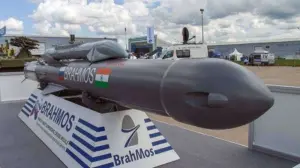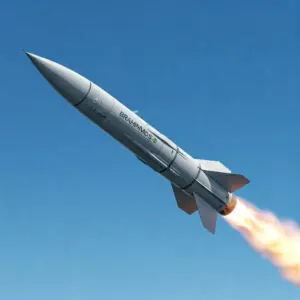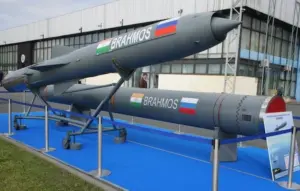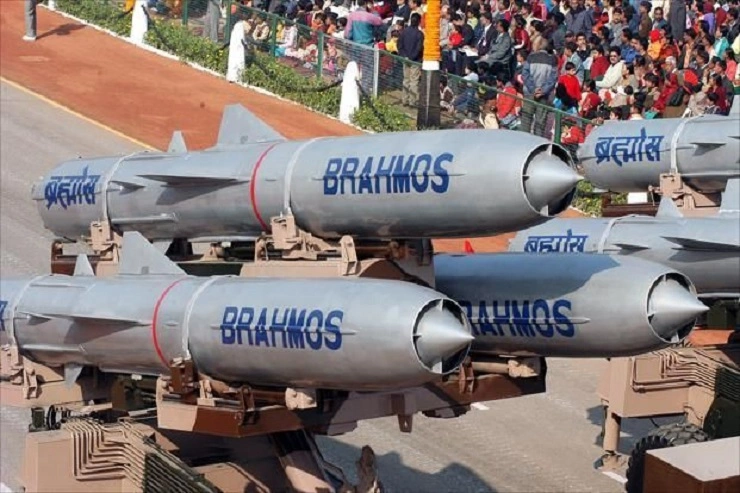Introduction to BrahMos Missile
The BrahMos missile is a supersonic cruise missile developed by India in collaboration with Russia. It is recognized as the world’s fastest supersonic cruise missile in active service. Named after two rivers — the Brahmaputra of India and the Moskva of Russia — it represents a significant milestone in India’s defense capabilities. The missile is capable of being launched from land, sea, sub-sea, and air platforms, making it a versatile and powerful weapon in India’s strategic arsenal.
Table of Contents
Toggle| Feature | Details |
|---|---|
| Name | BrahMos |
| Type | Supersonic Cruise Missile |
| Launch Platforms | Land, Sea, Submarine, Aircraft |
| Speed | Mach 2.8 to 3.0 |
| Operational Status | In service |
Development and Collaboration
BrahMos was developed as a joint venture between India’s Defence Research and Development Organisation (DRDO) and Russia’s NPO Mashinostroyeniya. The collaboration led to the formation of BrahMos Aerospace Private Limited in 1998. The missile is based on Russia’s P-800 Oniks cruise missile technology and has been modified to meet Indian requirements.
| Partner | Contribution |
|---|---|
| DRDO (India) | Guidance, software, airframe, integration |
| NPO Mashinostroyeniya (Russia) | Engine and missile body |
| Joint Venture | BrahMos Aerospace Pvt. Ltd. (1998) |
Technical Specifications
The BrahMos missile stands out due to its precision, speed, and high destructive power. It uses a two-stage propulsion system — a solid-fuel booster for the first stage and a liquid-fuel ramjet for the second.
| Specification | Value |
|---|---|
| Length | ~8.4 meters (varies by version) |
| Diameter | 0.6 meters |
| Weight | ~3,000 kg |
| Warhead | 200-300 kg (Conventional) |
| Range | 290 km to 800 km (with newer variants) |
| Speed | Mach 2.8 to 3.0 |

Variants of BrahMos
Over the years, several versions of BrahMos have been developed for different platforms and mission profiles.
| Variant | Description |
|---|---|
| BrahMos Block I | Original land-based version |
| BrahMos Block II | Enhanced targeting capabilities |
| BrahMos Block III | High maneuverability and steep dive attack |
| BrahMos-NG | Lighter, smaller version for aircraft use |
| BrahMos-II | Hypersonic version under development |
Guidance and Navigation
BrahMos uses advanced inertial navigation systems (INS) and satellite guidance for mid-course updates. Terminal guidance is achieved through active radar homing, enabling pinpoint accuracy even at high speeds.
| System | Function |
|---|---|
| Inertial Navigation | Mid-course guidance |
| GPS/GLONASS support | Navigation correction |
| Active Radar Seeker | Terminal phase target acquisition |
| Accuracy | < 1 meter CEP (Circular Error Probable) |
Strategic Importance
BrahMos strengthens India’s deterrence capabilities and provides a rapid response option against high-value targets. Its ability to penetrate heavily defended airspace at supersonic speed gives it a decisive edge.
| Aspect | Strategic Impact |
|---|---|
| Speed | Reduces enemy reaction time |
| Versatility | Multi-platform deployment |
| Precision Strike | Ideal for high-value targets |
| Deterrence | Strengthens India’s second-strike ability |
Export Potential
India has cleared BrahMos for export to friendly nations, making it a key element in defense diplomacy. Countries like the Philippines have already signed deals, and interest has been shown by several ASEAN and Middle Eastern countries.
| Country | Status |
|---|---|
| Philippines | Contract signed (2022) |
| Vietnam | Interest expressed |
| UAE, Indonesia | Potential buyers under discussion |
| Export Restrictions | Subject to MTCR compliance |
Recent Developments
Recent advancements in BrahMos include extended range versions exceeding 700 km, the successful test of air-launched variants from Su-30MKI fighters, and ongoing work on the hypersonic BrahMos-II. The missile has also undergone multiple successful tests with indigenous components under the “Make in India” initiative.
Comparisons
BrahMos is often compared with other cruise missiles globally, such as the US Tomahawk, France’s SCALP, and Russia’s Kalibr. However, its supersonic speed and versatility distinguish it from its peers.
| Missile | Country | Speed | Range | Launch Platforms |
|---|---|---|---|---|
| BrahMos | India/Russia | Mach 2.8-3.0 | 290–800 km | Land, Sea, Air |
| Tomahawk | USA | Subsonic | ~1,600 km | Land, Sea |
| Kalibr | Russia | Subsonic | ~1,500–2,500 km | Land, Sea |
| SCALP EG | France | Subsonic | ~560 km | Air |

Challenges and Criticisms
Despite its success, BrahMos has faced certain challenges including technological dependency on Russian components, weight limitations for air-launched variants, and export delays due to bureaucratic hurdles.
| Issue | Details |
|---|---|
| Technological Dependency | Russian input still significant |
| Export Restrictions | Limited to MTCR-compliant nations |
| Air Deployment Limitations | Su-30MKI only platform currently |
| Development Delays | BrahMos-II timelines pushed |
BrahMos Missile Range
BrahMos was initially limited to 290 km due to MTCR restrictions. Post India’s MTCR membership, enhanced range versions have been developed with up to 800 km capability.
| Version | Range (km) |
|---|---|
| Original | 290 |
| Enhanced Version | 450 |
| Extended Range | 800+ |
Nishant Agarwal BrahMos Aerospace
Nishant Agarwal, a former senior engineer at BrahMos Aerospace, was arrested in 2018 for alleged espionage activities. His case brought attention to the sensitive nature of missile technology and the need for robust cybersecurity in defense R&D.
BrahMos Aerospace
BrahMos Aerospace is a joint venture company responsible for the development and production of the BrahMos missile. Its headquarters is located in New Delhi, with manufacturing facilities in Hyderabad, Nagpur, and Thiruvananthapuram.
| Parameter | Details |
|---|---|
| Established | 1998 |
| HQ | New Delhi, India |
| Partners | DRDO (India), NPO Mashinostroyeniya (Russia) |
| Key Facilities | Hyderabad, Nagpur, Thiruvananthapuram |
BrahMos Aerospace Thiruvananthapuram Limited
This facility focuses on precision machining and integration of missile components. It plays a key role in the missile’s final assembly and testing.
BrahMos Missile Speed in km
The speed of brahmos missile travels at speeds ranging from 3,400 to 4,100 km/h, depending on the variant and atmospheric conditions.
| Speed (Mach) | Speed (km/h) |
|---|---|
| Mach 2.8 | ~3,400 km/h |
| Mach 3.0 | ~4,100 km/h |
BrahMos Aerospace Share Price
BrahMos Aerospace is not a publicly traded company. It is a government-private partnership entity and does not have listed shares on the stock exchange.
| Company | Share Availability |
|---|---|
| BrahMos Aerospace | Not listed/public |
| Ownership | DRDO + Russian NPO |
BrahMos 2 (Hypersonic Missile)
BrahMos-II is an advanced hypersonic cruise missile under development. It aims to reach speeds of Mach 6 to Mach 8, drastically reducing enemy reaction time and enhancing strike capabilities.
| Parameter | Projected Capability |
|---|---|
| Speed | Mach 6–8 |
| Status | Under development |
| Expected Range | 600+ km |
| Technology Base | Scramjet propulsion |

BrahMos Missile UPSC
BrahMos is a relevant topic for UPSC aspirants under science and technology, defense systems, and India’s strategic defense initiatives. It highlights India’s self-reliance and technological prowess.
Conclusion
The BrahMos missile exemplifies India’s technological advancement and strategic foresight in modern warfare. Its development, through an Indo-Russian collaboration, has not only enhanced India’s military capability but also positioned it as a defense exporter. With continuous upgrades, including increased range, air-launched and submarine-launched versions, and the upcoming hypersonic BrahMos-II, the missile remains a cornerstone of India’s defense deterrence. It stands as a shining example of indigenous defense manufacturing, technology transfer, and global defense cooperation.
Read More : Russian Su 57 Fighter Jet , HAL Tejas
Appendix: Key Facts at a Glance
| Category | Details |
|---|---|
| Full Name | BrahMos Supersonic Cruise Missile |
| Developers | DRDO (India) & NPO Mashinostroyeniya (Russia) |
| Managing Company | BrahMos Aerospace Pvt. Ltd. |
| Year of First Test | 2001 |
| Operational Status | Active in Indian Army, Navy, and Air Force |
| Warhead | Conventional (200–300 kg) |
| Speed | Mach 2.8 to Mach 3.0 (~4,100 km/h) |
| Maximum Range | 800+ km (new variants) |
| Guidance System | INS + GPS/GLONASS + Active Radar |
| Notable Export Deal | Philippines (2022) |
| Next-Gen Version | BrahMos-II (Hypersonic, Mach 6–8) |
BrahMos Missile Overview Table
| Category | Details |
|---|---|
| Type | Cruise Missile, Air-Launched Cruise Missile, Anti-Ship Missile, Land-Attack Missile, Surface-to-Surface Missile, Submarine-Launched Cruise Missile |
| Place of Origin | India, Russia |
| In Service Since | November 2005 |
| Used By | Indian Army, Indian Navy, Indian Air Force, Philippine Marine Corps |
| Designer | DRDO (India), NPO Mashinostroyeniya (Russia) |
| Manufacturer | BrahMos Aerospace Limited |
| Unit Cost | BrahMos: US$ 3.5 million BrahMos-ER: US$ 4.85 million |
| Variants | Ship-launched, Land-launched, Submarine-launched, Air-launched, BrahMos-ER, BrahMos-NG, BrahMos-II |
Specifications
| Parameter | BrahMos | BrahMos-A | BrahMos-NG |
|---|---|---|---|
| Mass | 3,000 kg (6,600 lb) | 2,500 kg (5,500 lb) | 1,200–1,500 kg (2,600–3,300 lb) |
| Length | 8.4 m (28 ft) | — | 6 m (20 ft) |
| Diameter | 0.6 m (2.0 ft) | — | 0.5 m (1.6 ft) |
| Warhead | 200–300 kg nuclear/conventional/semi-armour-piercing |
Propulsion
| Stage | Engine | Propellant |
|---|---|---|
| 1st Stage | Solid Rocket Booster (by EEL) | Solid Fuel |
| 2nd Stage | Liquid Ramjet (by NPO) | Liquid Fuel |
Range (Operational)
| Launch Platform | Range |
|---|---|
| Ship or Land | 800–900 km (500–560 mi) |
| Air Platform | 450–500 km (280–310 mi) |
| Export Version | 290 km (180 mi) |
Flight Characteristics
| Parameter | Value |
|---|---|
| Flight Ceiling | 15 km (49,000 ft) |
| Sea Skimming Altitude | 3 to 10 meters |
| Maximum Speed | Mach 3 (~3,700 km/h) |
Guidance & Accuracy
| Phase | System |
|---|---|
| Mid-course Guidance | INS (Inertial Navigation System) + Satellite Navigation |
| Terminal Guidance | Active Radar Homing |
| Accuracy | 1 meter CEP (Circular Error Probable) |
Launch Platforms
| Platform Type | Examples |
|---|---|
| Warship | Vertical Launch System on Naval Vessels |
| Land-Based | Transporter Erector Launcher (TEL) |
| Submarine | Submerged Launch Capability |
| Fighter Aircraft | Su-30MKI (Air-Launched Variant) |
Suggested Readings and UPSC Prep Topics
For aspirants of competitive exams like UPSC, BrahMos can be studied under:
-
Science and Technology: Missile Technology, Supersonic vs Hypersonic
-
International Relations: India-Russia defense ties, MTCR membership
-
Security Issues: Indigenous defense manufacturing, Make in India
-
Ethics & Governance: Espionage cases (e.g., Nishant Agarwal)
